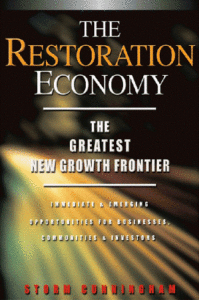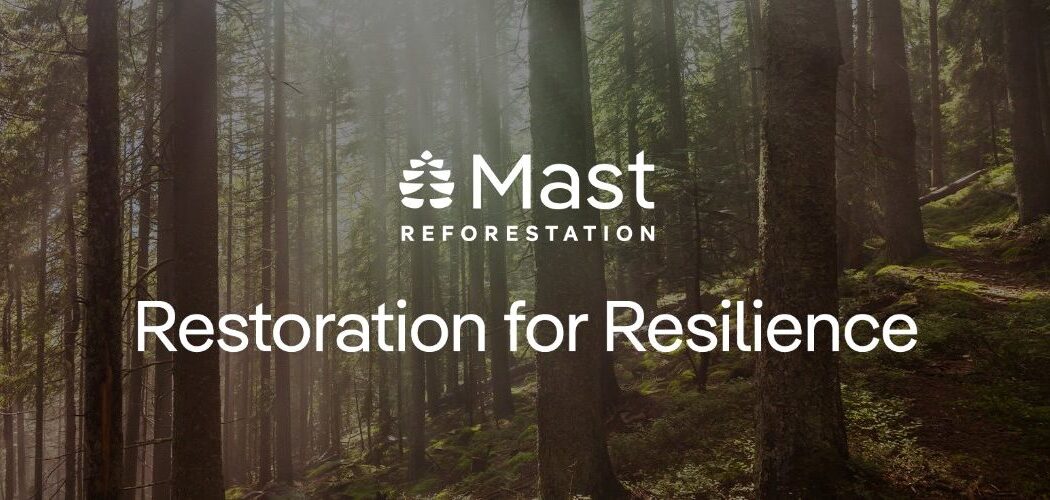Back in 2002, the groundbreaking book, The Restoration Economy, predicted that vertical integration would start taking place as the market for environmental restoration products and services grew.
 The latest example of that trend came on March 7, 2023, when climate tech company Mast, the newly-formed parent company of DroneSeed, announced its acquisition of California-based Cal Forest Nurseries, which supplies the majority of seedlings used for reforestation in California.
The latest example of that trend came on March 7, 2023, when climate tech company Mast, the newly-formed parent company of DroneSeed, announced its acquisition of California-based Cal Forest Nurseries, which supplies the majority of seedlings used for reforestation in California.
Mast restores forests after large-scale wildfires with reforestation projects that generate high quality carbon removal credits. With the acquisition of Cal Forest, Mast addresses a major obstacle to scaling reforestation: an inadequate supply of tree seed and seedlings.
Mast’s first acquisition of a seed bank and seedling nursery came in August 2021, when the company added 130-year-old Silvaseed to its supply chain. Since it acquired Silvaseed, Mast increased its seed supply by over three times, resulting from the company expanding its tech and capacity.
Along with Cal Forest Nurseries, Mast also acquired Siskiyou Seed, a seed supplier and processor that complements Silvaseed, reinforcing Mast’s position as the largest private seed supplier in the Western U.S. With Cal Forest, Siskiyou Seed, and Silvaseed all contributing to the company’s supply chain, Mast will expand its geographical reach to support more fire-impacted communities.
The company chose its new name, Mast, from the forestry term describing the once or twice per decade phenomenon in which multiple trees simultaneously produce a large crop of seed-bearing cones.
The addition of Cal Forest strengthens Mast’s vertical integration in response to reforestation supply chain challenges due to bigger, hotter, wildfires driven by climate change. By combining technology and legacy forestry practices with seed and seedling supplies, Mast can execute an ever-greater number of post-fire reforestation projects in partnership with landowners.
According to the National Interagency Fire Center, wildfires in recent decades burn an average of 7 million acres every year, compared with only 2 million acres in annual burn before the 1990s.
This increase of 5 million more acres burned in wildfires every year is equivalent to the land area of New Jersey. In addition to burning more land, hotter fires fueled by climate change also impede forests’ ability to naturally regenerate by destroying seeds that would survive less severe fires.
Cal Forest Nurseries is a trusted reforestation resource and critical link in the reforestation supply chain. The nursery has deep knowledge and proven experience growing an abundance of high-quality seedlings for a variety of tree species.
Longtime customers include large public and private organizations such as major timber company Sierra Pacific Industries, the U.S. Bureau of Land Management (BLM) and the U.S. Forest Service (USFS).
“We’re excited and humbled to bring Cal Forest Nurseries––a revered institution in the world of forestry––into the Mast family. The Cal Forest brand is built on the quality of its product, the legacy of the people who make it, and the scale of its operations,” said Grant Canary, Mast founder and CEO.
“The addition of Cal Forest will help us further carry out our mission of making reforestation scalable. With Cal Forest, we plan to execute more high-quality carbon removal credit projects, serve more communities and geographies across the Pacific Northwest, and help more landowners get paid for restoring their land and providing measurable benefits to both people and planet,” he added.
Mast’s 2022 Henry Creek reforestation project in Western Oregon was the first in a growing pipeline of projects that demonstrates the power of the company’s vertically integrated supply chain to eliminate multi-year delays in reforestation.
Mast used its seed and seedling supplies to both aerially seed by drone and hand-plant seedlings grown at Silvaseed–a combination of processes that maximizes the probability of forest regeneration.
“For many years, Silvaseed and Cal Forest have collaborated–and even discussed combining operations, which is one of the many reasons that Mast felt like a great fit for us,” said Cal Forest’s former owner and founder, Tom Jopson.
“They will contribute young energy, new perspectives, and access to new financing that will build on the programs through which we have made reforestation much more reliable and cost-effective. Cal Forest operates at the highest level to produce high-quality seedlings as an integral part of the whole reforestation program for all western timber companies, private landowners and public agencies. I’m confident that Mast will continue Cal Forest’s long-standing legacy of high-quality seedlings and great service to customers all over the West,” he continued.
The sale of over 150,000 revenue-generating, removal-based carbon credits made this reforestation possible. The carbon dioxide removal and sequestration represented by those credits will occur over the next 100 years and more as the trees are protected and monitored by third parties.
Buyers of Henry Creek carbon removal credits include Shopify, TIME CO2, and Carbon Title. By the end of 2022, Mast sold all available credits generated from Henry Creek on voluntary carbon markets.
“We strongly believe the Mast model for carbon removal credits backed by projects with strong permanence, additionality and measurability is the wave of the future. We were pleased to see Mast credits get the traction we expected on the open market this year,” said Katelin Holloway, Seven Seven Six Founding Partner.
In 2022, Mast partnered with private, government and nonprofit entities on seed collection efforts, collecting about 11,000 bushels of cones. With a larger supply of seed and seedlings, Mast plans to grow its reforestation project pipeline to support more fire-impacted communities.
Mast’s 2023 reforestation projects will include a site in Montana that will expand the elk habitat corridor around Yellowstone National Park. This and all future Mast projects will generate carbon removal-based credits to provide upfront funding for costly reforestation efforts.
Mast is a climate tech company with a mission to make reforestation scalable. As bigger, hotter, and more frequent fires increasingly destroy forested land each year, Mast facilitates faster, more resilient forest regeneration. Mast provides vertically integrated reforestation services to get forest restoration projects up and running in weeks, not years. Services include seed collection, seedling cultivation, site preparation, seedling hand planting, aerial drone-based seeding, and ongoing site monitoring.
“Utilizing carbon credit sales to finance reforestation as an alternative to venture investment is a big win for landowners and proponents of effective reforestation,” said Alexis Ohanian, Founder of Seven Seven Six.
“That innovation in finance combined with supply chain expansion add up to a bright future for Mast that will include more reforestation projects and meeting the market’s growing appetite for meaningful, high-quality carbon removal credits,” she explained.
To fund its projects and open new revenue streams for landowners, Mast sells forward-looking carbon removal credits that allow companies seeking carbon neutrality to invest in reforestation projects for 200 years or more. Mast’s investors include Alexis Ohanian’s Seven Seven Six, Social Capital, DBL Partners, Marc Benioff‘s TIME Ventures, Elemental Excelerator, and more.
Photo courtesy of Mast Reforestation.

